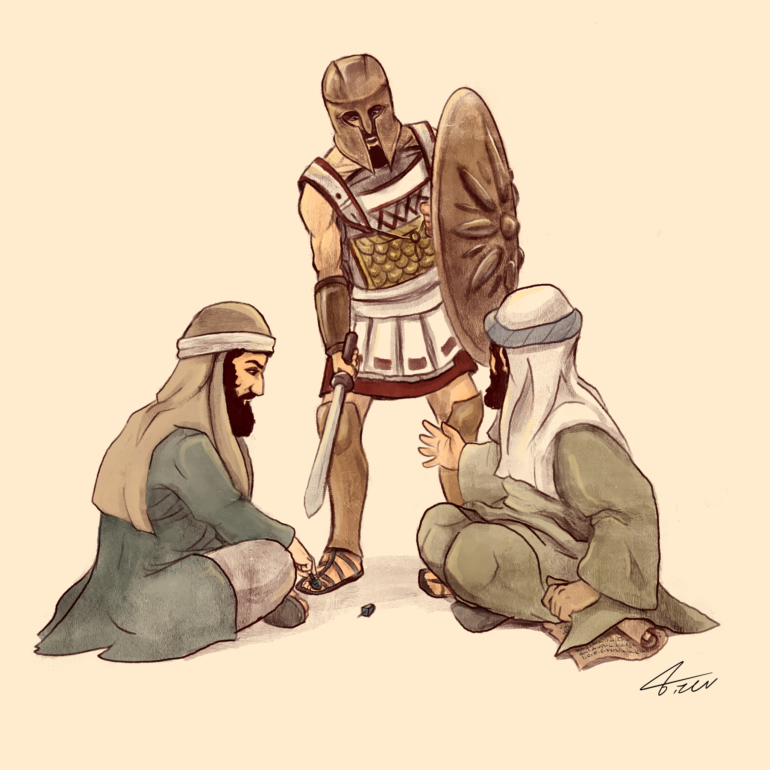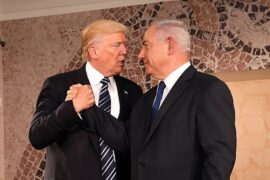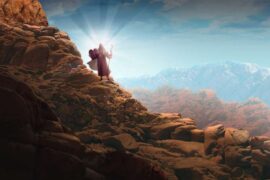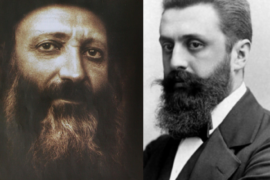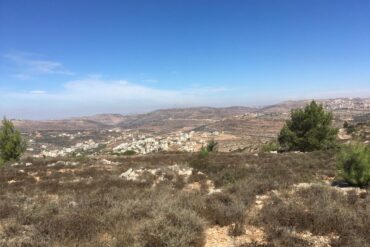The thirteenth chapter of a podcast series on the first Book of Maccabees.
For more content from VISION Magazine, subscribe to our newsletter and follow us on Twitter @VISION_Mag_, Facebook and YouTube. If you haven’t already, don’t forget to subscribe to our podcast on SoundCloud, iTunes, Stitcher, TuneIn, or Spotify and leave a rating and review to help us get our message out to a wider audience!
To support the podcast, head over to our PayPal portal and be sure to write a note that your contribution is for the podcast.
Hosted by: Robert Goodman
Transcript:
Shalom Aleikhem! And welcome back to Sefer Maccabim!
Last time we learned how Tryphon lured Yehonatan into Akko and subsequently slaughtered his men and took him prisoner. When we left off at the end of the chapter, the Jews are mourning Yonatan’s fate and are also extremely afraid because now the surrounding nations have gained courage and are preparing to fight against them to wipe them out.
It’s not just them. Tryphon himself has also raised an army in Akko and is intending to declare war on Judea.
Chapter 13 begins when Shimon, the last son of Matityahu, sees how his people are becoming deeply afraid and losing heart. So he goes to Jerusalem and gathers them in the courtyard of the Beit HaMikdash, and he gives the following speech:
“You yourselves have seen what I and my brothers have done for you, the battles we have fought and the suffering we have endured on behalf of our Torah and our Beit HaMikdash. So much that all my brothers have been slain for our people’s sake, and I alone am left. But I am no better than my brothers that I should live, and G-d forbid I should choose to spare my life rather than perish for our law! I will show that I too am worthy of being called their brother, and I will surely avenge their blood and preserve you, your wives, your children and our Beit HaMikdash from all the nations around who wish to destroy us.”
It’s a truly inspiring speech; Shimon promises to lead the Jews to victory as courageously and selflessly as his brothers and it does the job. The people, who previously were downcast, are encouraged. And they pledge: “Just as we followed your brothers Yehuda and Yehonatan, so shall we follow you! Go and fight our battles, and whatever you command us, we shall do.”
They accept his authority and appoint him as the new Kohen Gadol.
After Shimon is accepted by his people, he hastens to finish the job Yehonatan started and builds up and fortifies the walls around Jerusalem, because these walls have already been broken down and he doesn’t want Tryphon to arrive and march straight through the broken walls into the city. He also sends some forces to capture Jaffa because he doesn’t want it falling into Tryphon’s hands.
But Tryphon doesn’t try to take Jaffa. Instead, he marches straight into Judea heading for Jerusalem, and he brings Yehonatan with him as his prisoner. Shimon meets him with his army in a place called Adida. When Tryphon realizes that Shimon is now leading the people, he slyly offers him a deal: “If you hand over to me a hundred talents of silver and two of Yonatan’s sons as hostages, I’ll release your brother.”
Now this puts Shimon in a very tough situation. On the one hand, he doesn’t trust Tryphon as far as he can throw him, and in no way expects him to keep his word. On the other hand, if he doesn’t comply and Tryphon kills Yehonatan, people will forever be able to accuse him of killing his brother. Shimon explains the situation to his officers, and reluctantly sends Yehonatan’s sons and the silver over to Tryphon.
As expected, Tryphon does not release Yehonatan, but begins marching his army all over Judea, intending to cause as much damage as possible. And to save Jerusalem for last. But Shimon doesn’t let him get started; undoubtedly furious at Tryphon not keeping his word, he blocks Tryphon’s army with his own wherever he tries to conquer, and Tryphon can’t get a foothold in Judea. Pretty soon he starts to get fed up, especially that he’s hauling around Yehonatan and two of his sons as hostages everywhere.
Now remember how in the previous chapter Yehonatan built a wall around the Acra so that no one could get in or out? Well he did his job well, supplies there are rapidly dwindling, to the point where its inhabitants are forced to send a message to Tryphon requesting food, because they are very rapidly running out. So Tryphon plans to ascend to Jerusalem that very night coming from the east, via the Judean Desert. But there’s a heavy snowfall and he can’t make it, so he calls it off.
At this point Tryphon has just about had enough of Judea and decides to leave. First he travels to Beit She’an where he decides he doesn’t need Yehonatan as a hostage anymore. He murders him and orders him buried there. Then Tryphon returns with his army to Antioch.
Shimon has Yehonatan’s bones retrieved and brought to burial with his father’s and brothers’ bones in Modiin, and there’s a great mourning period for Yonatan, the wonderful leader who served as Kohen Gadol for four years and brought the Jews through so much.
To immortalize his brothers, Shimon builds a huge monument of white marble on their gravesite, and seven more large and beautiful pyramids, one for each member of his family. This monument could be seen from a great distance away, even from the Mediterranean Sea, and serves as a beautiful reminder to the self-sacrifice of Matityahu and his sons and all they did for the children of Israel.
Unfortunately the monument and pyramids are not there today, but we do know that they stood for more than two hundred years, because Josephus, who wrote his Antiquities (13:6.6) at the end of the 1st century CE, testifies in them that the pyramids “have been preserved to this day.”
Now Tryphon returns to Antioch, kills the young king Antiochus VI, and claims the throne for himself. Unfortunately he’s a really rubbish ruler and brings the whole Seleucid Empire to ruin.
Shimon eyes his chance and sends men to Demetrius with a gold crown and a scarlet robe, and the following message: “Tryphon is doing a really bad job at ruling. We are willing to back you as emperor, on condition that you free us from all tributes we were previously paying to you.”
You can see here how Shimon is using the same diplomatic tactics as Yehonatan. He doesn’t care much whether Tryphon or Demetrius rules, but he’s willing to exploit the situation to advance his own goal of Judean independence. And sure enough, his tactics work. Demetrius sends back a message agreeing to Shimon’s request, and formally releasing Judea from any tributes or taxes imposed on them by the Seleucid Empire, and effectively agreeing to a peace treaty.
And believe it or not, this is it. The war is won. The land has been liberated, the Jews are no longer subject to foreign taxes or tributes – for the first time in over 300 years, since Nevukhadnetzar invaded Eretz Yisrael, the Jews are officially independent! The Maccabees have finally accomplished what they set out to do a generation earlier.
The first Book of Maccabees (13:42-43) words it as follows:
“.וישבר עול הגויים מעל בני ישראל. ומאז החלו לכתוב בדברי הימים ובכל ספריהם, בשנה הראשונה לשמעון הכהן הגדול שר ונשיא ליהודים”
“And the yoke of the nations was removed from upon the children of Israel. And from then they began to write in their chronicles and their documents, ‘In the first year of Shimon the Kohen Gadol, the governor and leader of the Jews.’”
Note that while Shimon assumes the titles of “Kohen Gadol” and “Nasi” (“leader” or “prince”), he does not assume the title of “Melekh” (“king”), for reasons we shall discuss in future episodes.
The date on which the Jews finally declare independence is the 18th of Elul, and it is proclaimed as a public holiday just like Yom Nikanor and the 28th of Shvat. So it’s interesting to think about the fact that Yom HaAtzmaut on the 5th of Iyar is not the only Jewish Independence Day – then we declared independence from Britain, but here we declared independence from Greece.
Maybe we should begin having a barbeque on the 18th of Elul too!
However, just because the Jews are now free that does not mean they can rest on their laurels. There’s still a significant Hellenistic presence in the land.
Under Shimon’s rule the Jews capture several idolatrous cities including Gaza and cleanses them of Greek idols, and then they turn to their main project: the Acra.
By now the Hellenists and mercenaries in the tower are completely desperate; they are out of food and many are dying from hunger. When the Jews besiege the tower the situation becomes unbearable for them, and they beg Shimon for mercy.
Graciously, Shimon agrees. He lets them out of the tower and sends them away.
When Shimon enters the tower the Jews make a huge celebration with numerous musical instruments and much singing and waving of lulavim, because the stronghold of the Greek occupation, which caused the Jews so much sorrow and pain, has finally fallen into their hands. This happens on the 23rd of Iyar, which is declared yet another public holiday.
After the celebrations, Shimon gathers the people and tells them that now they’re going to raze the Acra to the ground, to completely eradicate any sign the Greeks were ever here. And also, in case any foreign nation should ever invade in the future, that they should have nowhere to launch their attacks from.
The people are eager to carry out Shimon’s will, which shows just how willingly they have accepted him as their leader, because they know that he is only looking out for them.
After they demolish the Acra, Shimon orders that the mountain upon which it stood should be completely leveled and made lower than the Temple Mount. Again, the people comply. Altogether, the task takes them three years.
This brings us nicely to the end of chapter 13, and it certainly closes on a much happier note than the previous chapter. But don’t go away just yet!
There’s still much to come in this series on the Book of Maccabees.
P.S. – If you’ve listened or read this far then first of all, thank you! And secondly, it probably means you’re at least reasonably interested in learning about the Maccabean Revolt.
If that’s true, there’s a book I’d like to recommend to you. It’s called My Glorious Brothers, written by author Howard Fast, and it tells the Maccabean Revolt through the eyes of Shimon – how he grew up in Modiin, witnessed the increasing Hellenization of Judea and launched the revolt with his father and brothers.
It’s truly an inspiring book and although I’m totally biased, I can’t recommend it enough. So please give it a read if you can. It’s possible to buy a hard copy on eBay but I suggest finding it on Audible, where if you opt for a 30-day trial, you can listen to the audiobook for free.

